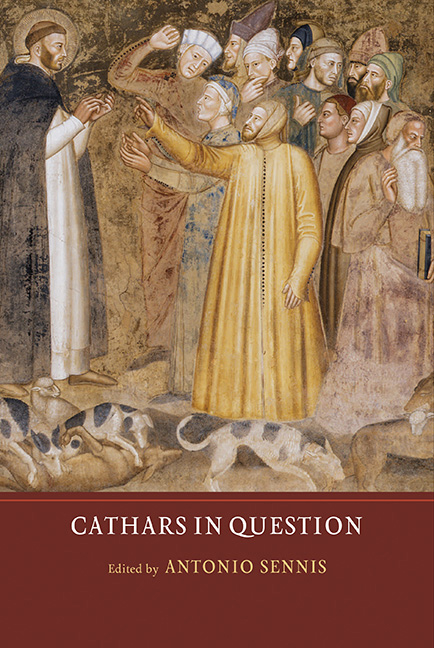Book contents
- Frontmatter
- Contents
- Acknowledgments
- 1 Questions about the Cathars
- 2 The Paradigm of Catharism; or, the Historians’ Illusion
- 3 The Cathar Middle Ages as a Methodological and Historiographical Problem
- 4 The Heretical Dissidence of the ‘Good Men’ in the Albigeois (1276–1329): Localism and Resistance to Roman Clericalism
- 5 The Heretici of Languedoc: Local Holy Men and Women or Organized Religious Group? New Evidence from Inquisitorial, Notarial and Historiographical Sources
- 6 Cathar Links with the Balkans and Byzantium
- 7 Pseudepigraphic and Parabiblical Narratives in Medieval Eastern Christian Dualism, and their Implications for the Study of Catharism
- 8 The Cathars from Non-Catholic Sources
- 9 Converted-Turned-Inquisitors and the Image of the Adversary: Ranier Sacconi Explains Cathars
- 10 The Textbook Heretic: Moneta of Cremona's Cathars
- 11 ‘Lupi rapaces in ovium vestimentis’: Heretics and Heresy in Papal Correspondence
- 12 Looking for the ‘Good Men’ in the Languedoc: An Alternative to ‘Cathars’?
- 13 Principles at Stake: The Debate of April 2013 in Retrospect
- 14 Goodbye to Catharism?
- Index
- Miscellaneous Endmatter
12 - Looking for the ‘Good Men’ in the Languedoc: An Alternative to ‘Cathars’?
Published online by Cambridge University Press: 31 March 2017
- Frontmatter
- Contents
- Acknowledgments
- 1 Questions about the Cathars
- 2 The Paradigm of Catharism; or, the Historians’ Illusion
- 3 The Cathar Middle Ages as a Methodological and Historiographical Problem
- 4 The Heretical Dissidence of the ‘Good Men’ in the Albigeois (1276–1329): Localism and Resistance to Roman Clericalism
- 5 The Heretici of Languedoc: Local Holy Men and Women or Organized Religious Group? New Evidence from Inquisitorial, Notarial and Historiographical Sources
- 6 Cathar Links with the Balkans and Byzantium
- 7 Pseudepigraphic and Parabiblical Narratives in Medieval Eastern Christian Dualism, and their Implications for the Study of Catharism
- 8 The Cathars from Non-Catholic Sources
- 9 Converted-Turned-Inquisitors and the Image of the Adversary: Ranier Sacconi Explains Cathars
- 10 The Textbook Heretic: Moneta of Cremona's Cathars
- 11 ‘Lupi rapaces in ovium vestimentis’: Heretics and Heresy in Papal Correspondence
- 12 Looking for the ‘Good Men’ in the Languedoc: An Alternative to ‘Cathars’?
- 13 Principles at Stake: The Debate of April 2013 in Retrospect
- 14 Goodbye to Catharism?
- Index
- Miscellaneous Endmatter
Summary
This volume addresses the question of whether, in the twelfth and thirteenth centuries, there existed a distinctive dualist religious movement, ranging from Asia Minor almost to the Atlantic. It seems important in this context to consider terminology and how it affects the discussion. Specifically, I am going to consider terminology used in the Middle Ages for southern French examples of what historians have come to call ‘Cathars’ and ‘Catharism’. There is a legitimate debate about whether we should be using the terms. This is quite distinct from the debate about whether ‘Cathars’ were dualists. It is also distinct from the debate about whether southern French dualists, called ‘Cathars’ or otherwise, were connected to other pockets of dualism. However, all three elements of the traditional approach – the name, the dualism, the international phenomenon – are coming to be dealt with separately in recent, refreshingly iconoclastic, but very scholarly, francophone works. Monique Zerner et al. deny the evidence of dualism in the West; Jean-Louis Biget finds an indigenous dualism which was independent of external influence, and does not call it Catharism; Pilar Jiménez-Sanchez considers the western phenomena as different ‘Catharisms’.
In the dominant anglophone literature, as in the traditional francophone, it is as though ‘western dualism’ and ‘Catharism’ were the same thing, even though we all know that ‘Catharism’ is an ahistorical term for the medieval phenomenon, or phenomena, under discussion. The traditionalists know that it was hardly used in, or of, southern France, and not very often elsewhere either, and do not argue otherwise. But whilst it could be argued that we need some universal label for the people whom inquisitors, unhelpfully, simply called ‘heretics’, so that we know that we are all talking about the same phenomenon (however we interpret it), this approach presupposes an association between western heresies called ‘Cathar’ by their detractors; that they were alike and connected, even though they were geographically distant, and did not always use the same terminology as each other to describe themselves. My opinion is that ‘alike and connected’ does indeed describe what the sources reveal, and that we may legitimately use a short-hand terminology for it, while nonetheless noting significant differences between groups on account of the ways they developed.
- Type
- Chapter
- Information
- Cathars in Question , pp. 242 - 256Publisher: Boydell & BrewerPrint publication year: 2016



